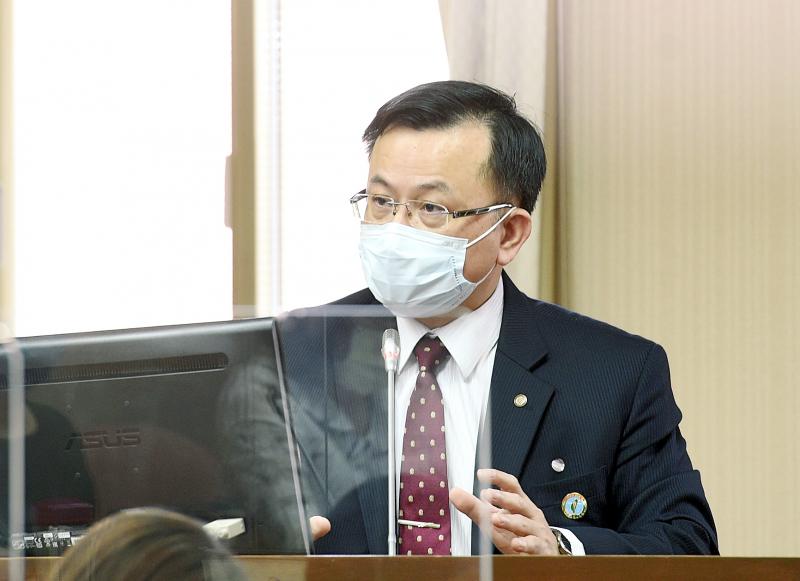People in Taiwan can access 5G services at relatively cheap rates compared with other advanced countries, National Communications Commission (NCC) Chairman Chen Yaw-shyang (陳耀祥) yesterday told lawmakers at a meeting of the legislature’s Transportation Committee.
Although Chen was there to brief lawmakers about the commission’s budget plan for the next fiscal year, they asked him mostly about his meeting with telecom executives on Thursday last week, where he was expected to convey legislators’ expectations that telecoms would boost the 5G penetration rate nationwide by lowering monthly fees.
Four of Taiwan’s five large telecoms charge NT$1,399 per month for an unlimited data plan, while Taiwan Star charges NT$999 per month, Chen said, adding that a variety of data plans are available.

Photo: Peter Lo, Taipei Times
Taiwan does not have significant market players in 4G or 5G markets, and as such telecoms can sell these plans without having to secure NCC approval for the rates, Chen said.
“When one takes into account people’s buying power and other factors, Taiwan’s 5G service rates might not be the lowest, but they are relatively cheap when compared with other advanced countries,” he said, adding that the commission would continue to urge telecoms to offer more promotional plans so that more people would be motivated to migrate from 4G to 5G.
One of the telecom executives at last week’s meeting, who preferred to stay anonymous, said that an unlimited data plan in a 5G system costs NT$2,225 per month in South Korea, NT$1,729 in Japan and NT$1,959 in the US.
South Korea’s 5G penetration rate is about 25 percent after the services were launched two years ago, whereas Taiwan’s 5G penetration rate reached 13 percent last month after services were launched in June last year, she said.
Although the cost of building a 5G system in Taiwan is about three to four times higher than that for a 4G system, subscribers are paying NT$1,399 per month, the same as for 4G services when they were launched in 2014, she said.
However, 5G subscribers are given more minutes for extranet phone calls and more subsidies for 5G smartphone purchases, she said, adding that people in Taiwan pay a fair price for top-rated 5G services.
Meanwhile, Taiwan People’s Party Legislator Andy Chiu (邱臣遠) yesterday accused the NCC of wasting nearly NT$7 million to create a Facebook page that has generated very few views.
The NCC last year recruited a public relations firm to launch an educational campaign on Facebook regarding the safety of electromagnetic waves, Chiu said.
Instead of posting content created by the commission itself, the NCC’s Facebook page merely reposted 50 articles from the Internet, and some of the articles were not even “liked” by any viewers, Chiu said.
Chen defended the spending for the awareness campaign, saying that people are debating the safety of electromagnetic waves.
Social media is a good place to share accurate information regarding electromagnetic waves, he said, although he added that content published on the page does have room for improvement.
The public relations firm also hosted 20 meetings in various localities as part of the campaign, he said.

‘DENIAL DEFENSE’: The US would increase its military presence with uncrewed ships, and submarines, while boosting defense in the Indo-Pacific, a Pete Hegseth memo said The US is reorienting its military strategy to focus primarily on deterring a potential Chinese invasion of Taiwan, a memo signed by US Secretary of Defense Pete Hegseth showed. The memo also called on Taiwan to increase its defense spending. The document, known as the “Interim National Defense Strategic Guidance,” was distributed this month and detailed the national defense plans of US President Donald Trump’s administration, an article in the Washington Post said on Saturday. It outlines how the US can prepare for a potential war with China and defend itself from threats in the “near abroad,” including Greenland and the Panama

A wild live dugong was found in Taiwan for the first time in 88 years, after it was accidentally caught by a fisher’s net on Tuesday in Yilan County’s Fenniaolin (粉鳥林). This is the first sighting of the species in Taiwan since 1937, having already been considered “extinct” in the country and considered as “vulnerable” by the International Union for Conservation of Nature. A fisher surnamed Chen (陳) went to Fenniaolin to collect the fish in his netting, but instead caught a 3m long, 500kg dugong. The fisher released the animal back into the wild, not realizing it was an endangered species at

The High Prosecutors’ Office yesterday withdrew an appeal against the acquittal of a former bank manager 22 years after his death, marking Taiwan’s first instance of prosecutors rendering posthumous justice to a wrongfully convicted defendant. Chu Ching-en (諸慶恩) — formerly a manager at the Taipei branch of BNP Paribas — was in 1999 accused by Weng Mao-chung (翁茂鍾), then-president of Chia Her Industrial Co, of forging a request for a fixed deposit of US$10 million by I-Hwa Industrial Co, a subsidiary of Chia Her, which was used as collateral. Chu was ruled not guilty in the first trial, but was found guilty

The Chinese Nationalist Party (KMT) is maintaining close ties with Beijing, the Democratic Progressive Party (DPP) said yesterday, hours after a new round of Chinese military drills in the Taiwan Strait began. Political parties in a democracy have a responsibility to be loyal to the nation and defend its sovereignty, DPP spokesman Justin Wu (吳崢) told a news conference in Taipei. His comments came hours after Beijing announced via Chinese state media that the Chinese People’s Liberation Army’s Eastern Theater Command was holding large-scale drills simulating a multi-pronged attack on Taiwan. Contrary to the KMT’s claims that it is staunchly anti-communist, KMT Deputy